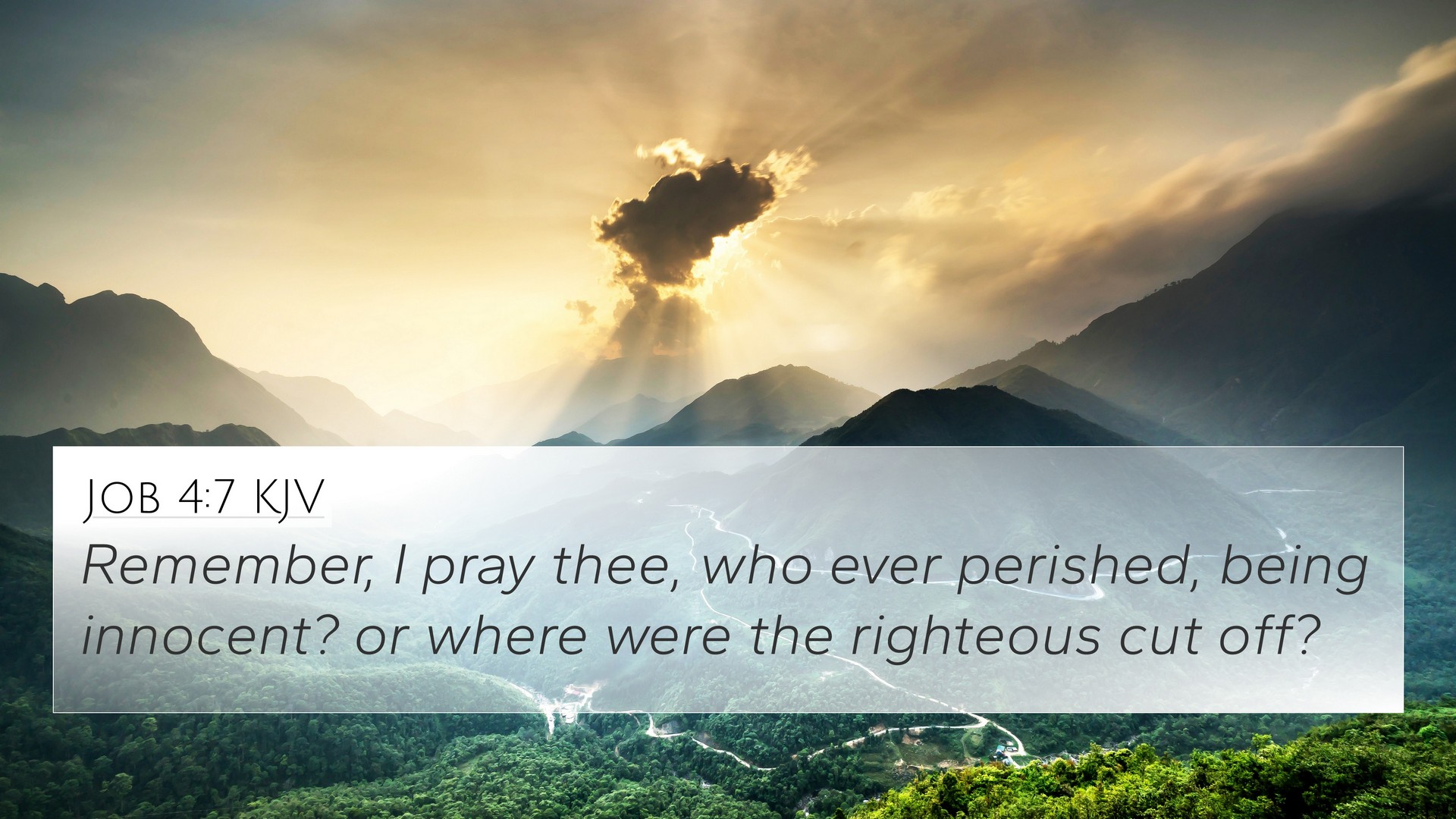Old Testament
Genesis Exodus Leviticus Numbers Deuteronomy Joshua Judges Ruth 1 Samuel 2 Samuel 1 Kings 2 Kings 1 Chronicles 2 Chronicles Ezra Nehemiah Esther Job Psalms Proverbs Ecclesiastes Song of Solomon Isaiah Jeremiah Lamentations Ezekiel Daniel Hosea Joel Amos Obadiah Jonah Micah Nahum Habakkuk Zephaniah Haggai Zechariah MalachiJob 4:7 Similar Verses
Job 4:7 Cross References
Remember, I pray thee, who ever perished, being innocent? or where were the righteous cut off?
Uncover the Rich Themes and Topics of This Bible Verse
Listed below are the Bible themes associated with Job 4:7. We invite you to explore each theme to gain deeper insights into the Scriptures.
Job 4:7 Cross Reference Verses
This section features a detailed cross-reference designed to enrich your understanding of the Scriptures. Below, you will find carefully selected verses that echo the themes and teachings related to Job 4:7 KJV. Click on any image to explore detailed analyses of related Bible verses and uncover deeper theological insights.
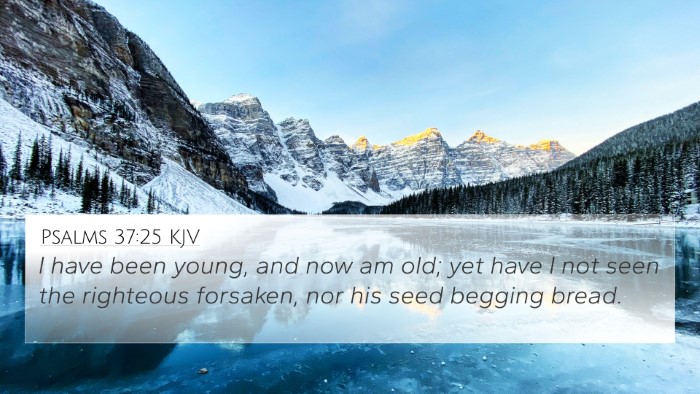
Psalms 37:25 (KJV) »
I have been young, and now am old; yet have I not seen the righteous forsaken, nor his seed begging bread.

2 Peter 2:9 (KJV) »
The Lord knoweth how to deliver the godly out of temptations, and to reserve the unjust unto the day of judgment to be punished:
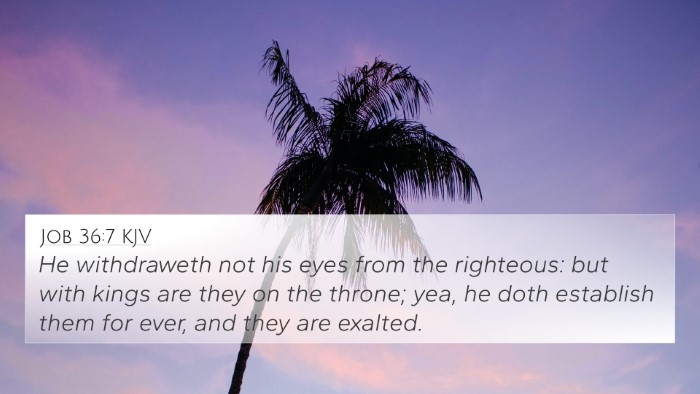
Job 36:7 (KJV) »
He withdraweth not his eyes from the righteous: but with kings are they on the throne; yea, he doth establish them for ever, and they are exalted.

Ecclesiastes 7:15 (KJV) »
All things have I seen in the days of my vanity: there is a just man that perisheth in his righteousness, and there is a wicked man that prolongeth his life in his wickedness.
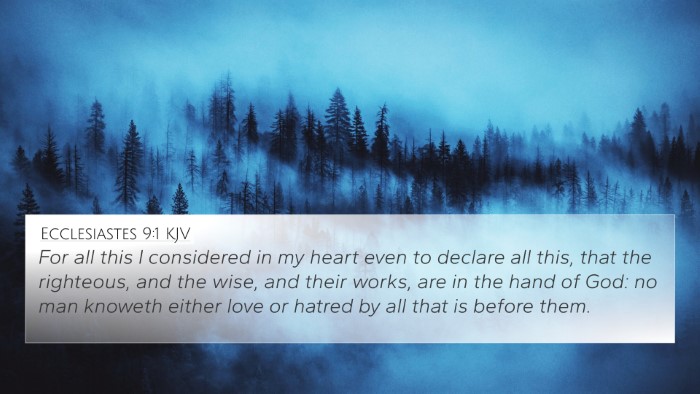
Ecclesiastes 9:1 (KJV) »
For all this I considered in my heart even to declare all this, that the righteous, and the wise, and their works, are in the hand of God: no man knoweth either love or hatred by all that is before them.
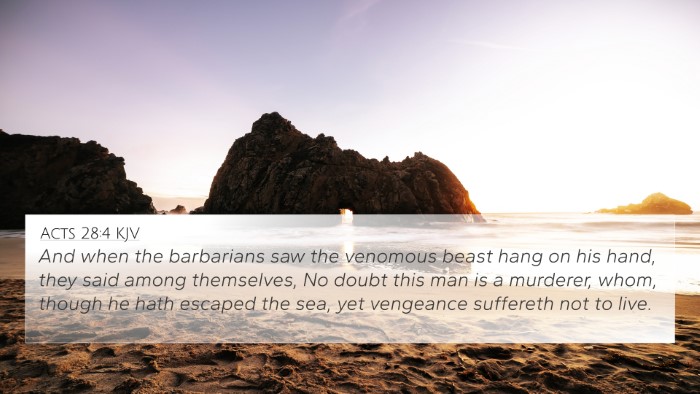
Acts 28:4 (KJV) »
And when the barbarians saw the venomous beast hang on his hand, they said among themselves, No doubt this man is a murderer, whom, though he hath escaped the sea, yet vengeance suffereth not to live.
Job 4:7 Verse Analysis and Similar Verses
Understanding Job 4:7 - Biblical Insights
Job 4:7 states, "Consider now: Who, being innocent, has ever perished? Where were the upright ever destroyed?" This verse, spoken by Eliphaz, raises critical questions about suffering, innocence, and divine justice. Below, we will explore the meaning of this verse, integrating insights from public domain commentaries and highlighting its theological significance.
Summary of Key Themes
- Divine Justice: Eliphaz implies that suffering is inherently linked to sinfulness, thus reflecting a common belief in the retributive justice of God.
- The Nature of Innocence: The verse questions the existence of the innocent sufferer, prompting a deeper investigation into what it means to be 'innocent' or 'upright' in God's eyes.
- Human Suffering: This highlights the existential dilemma surrounding human suffering and the apparent prosperity of the wicked compared to the trials of the righteous.
Insights from Commentaries
Matthew Henry’s Commentary
Henry notes that Eliphaz's argument is rooted in a traditional understanding of God's justice—that the upright are rewarded, and the wicked are punished. He stresses that while this may be generally true, exceptions exist, especially in the cases of Job and other Biblical figures, reminding us that divine judgment is not always immediate or visible in earthly terms.
Albert Barnes’ Commentary
Barnes emphasizes that Eliphaz's perspective is limited and reflective of a narrow view of divine justice. He points out that suffering may not always correlate with personal sin and that the presence of trials in a person's life does not necessarily indicate guilt. Barnes encourages readers to recognize the complexity of God's providence and the mysterious nature of His plans for humanity.
Adam Clarke’s Commentary
Clarke adds that while the premise of the verse holds weight in terms of moral order, it does not account for the pervasive reality of suffering among the righteous. He also warns against applying a simplistic view of retributive justice to all situations, advocating for a broader understanding of faith and endurance in times of adversity.
Cross-References and Related Verses
To enhance our understanding of Job 4:7, here are several cross-references that connect with its themes:
- Psalms 37:25: "I have been young, and now am old; yet have I not seen the righteous forsaken, nor his seed begging bread."
- Proverbs 11:31: "Behold, the righteous shall be recompensed in the earth: much more the wicked and the sinner."
- Luke 13:1-5: Jesus discusses the correlation between sin and suffering, highlighting that we must not presume to know others' sin based on their fate.
- John 9:1-3: Jesus uses the plight of a blind man to challenge assumptions about sin and suffering, indicating that suffering can serve a greater purpose.
- Romans 5:3-5: Paul teaches that tribulation produces perseverance, character, and hope, emphasizing growth through suffering.
- Job 1:1: Establishes Job’s uprightness to set a contrast against his suffering questioned by Eliphaz.
- Hebrews 12:6: "For whom the Lord loveth he chasteneth, and scourgeth every son whom he receiveth," indicating that trials may signify God’s love and purpose.
- 1 Peter 5:10: "But the God of all grace, who hath called us unto his eternal glory by Christ Jesus, after that ye have suffered a while, make you perfect, establish, strengthen, settle you," linking suffering with ultimate restoration.
- Ecclesiastes 9:2: "All things come alike to all: there is one event to the righteous, and to the wicked," providing a sobering look on the common fate of all.
- James 1:2-4: "My brethren, count it all joy when ye fall into divers temptations," illustrating a profound approach to suffering.
Theological Implications
The reflections on Job 4:7 compel believers to confront the complexities of faith in light of suffering. They urge examination of personal perspectives on retribution and divine justice, emphasizing that God's ways often transcend human understanding. The connections between these verses invite readers to explore the overarching narrative of God's interaction with humanity—both through grace and through trials.
Conclusion
Job 4:7 serves as a poignant reminder that while scripture often highlights the justice of God, it also reveals the intricate tapestry of human experience. The verse's themes challenge believers to cultivate a deeper faith amidst life’s uncertainties, fostering understanding through comprehensive Bible verse study and cross-referencing. By engaging with other related verses, individuals can find solace and strength in the shared message of hope, perseverance, and the faithfulness of God in every circumstance.
